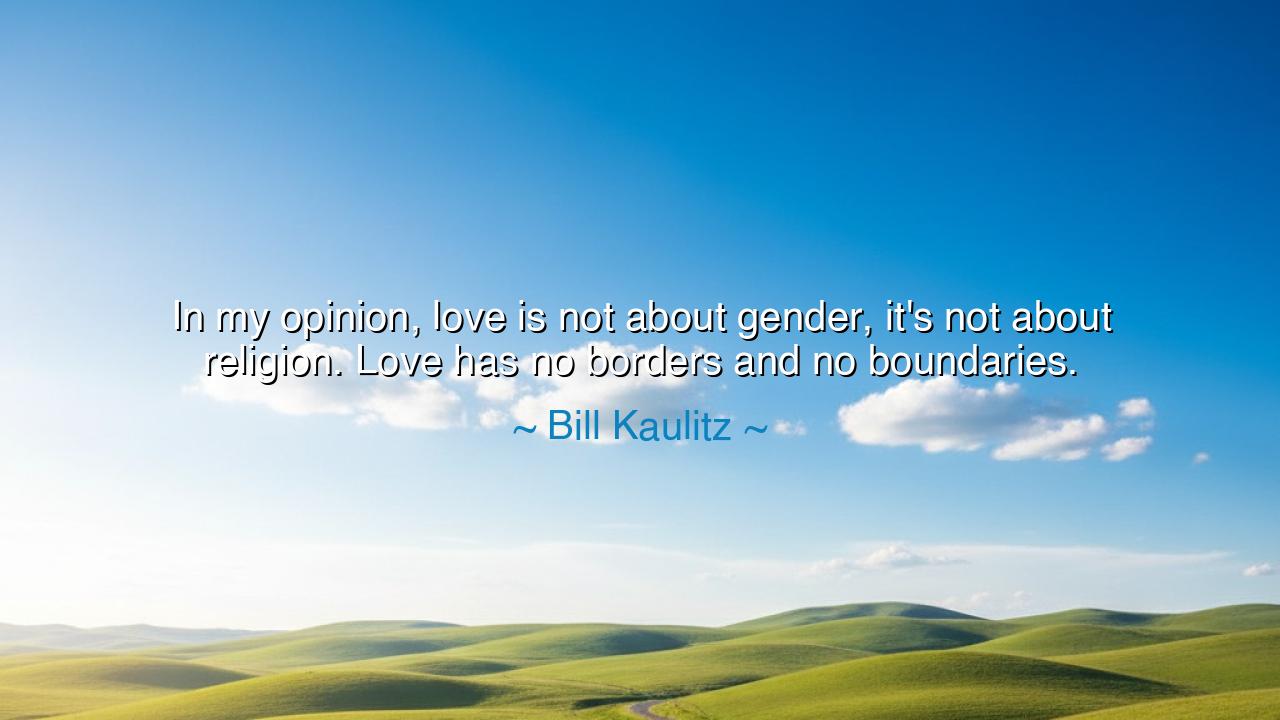
In my opinion, love is not about gender, it's not about religion.
In my opinion, love is not about gender, it's not about religion. Love has no borders and no boundaries.






"In my opinion, love is not about gender, it's not about religion. Love has no borders and no boundaries." These words from Bill Kaulitz are a powerful call to recognize the universal nature of love, transcending the limitations of gender, religion, and any other societal constructs that often seek to divide us. Kaulitz’s perspective challenges the narrow, sometimes restrictive views that confine love to predefined boundaries, urging us to embrace a broader, more inclusive understanding of what love truly is. In his view, love is not a commodity that can be controlled or defined by human-made barriers; rather, it is a force that transcends all divisions, a force that connects people in the most fundamental and universal way.
In the ancient world, love was often seen as a divine force, capable of bridging the gap between the human and the divine. The Greeks had Eros, the god of love, whose influence was boundless and could strike any soul, regardless of their status or background. The ancient philosophers, such as Plato, spoke of love as a means of transcending the physical realm to reach a higher spiritual plane. For Plato, love was not bound by the limitations of the body or even earthly desires, but was instead a search for something eternal, something that exists beyond human understanding. Plato’s Symposium outlines the journey of love as one that elevates the soul, helping it to recognize true beauty in all things, regardless of the form it takes.
The concept of unconditional love is also present in the Christian tradition, where Jesus Christ taught of love that transcends all boundaries. “Love thy neighbor as thyself,” he instructed, without distinction between race, gender, or belief. His message was one of inclusivity, urging people to see beyond the labels and differences that society places on individuals, and instead, to love others as they are. This is love that knows no limits, that asks nothing in return, and is not confined to any single group or belief system. In the Bible, God’s love is portrayed as a universal, unconditional force—one that offers forgiveness, healing, and grace to all, regardless of their background. It is a love that, like Kaulitz describes, has no borders and no boundaries.
Even in more recent history, love has been a force that breaks through the societal barriers that seek to limit it. Consider the love shared between Salvador Dalí and Gala Éluard, whose relationship defied the norms of the time. Dalí, the eccentric artist, and Gala, his muse, were not only partners in love but also in art. Their bond transcended traditional conventions, as Gala was initially married to Paul Éluard, a poet, yet she and Dalí’s love was pure and unconfined by conventional rules. Their partnership was a powerful symbol of how love, in its most authentic form, refuses to be restrained by rules—whether they be religious, social, or political. Dalí’s works, inspired by his love for Gala, reflect the idea of art as an extension of the soul’s boundless capacity to love and create beyond all limitations.
The lesson in Kaulitz’s words is profound: love is not something that should be confined by human constructs like gender or religion. Love, in its purest form, is a universal force—one that binds people together, regardless of their differences. True love recognizes the humanity in each individual, beyond the surface and beyond the labels. It is not bound by the expectations of society, but rather exists freely, as a force of connection and unity. Love, in this sense, is a reflection of the divine, a force that transcends all material concerns and brings us closer to one another and to something greater than ourselves.
In our own lives, we must strive to practice love without limitations. It is easy to get caught in the web of societal expectations—to think that love can only exist within certain parameters. Yet, as Kaulitz suggests, the true power of love lies in its ability to transcend these barriers. Let us seek to love without borders, to recognize and embrace the humanity in others, no matter their background, beliefs, or identity. Just as the ancient philosophers and religious leaders taught us to look beyond the surface, we must cultivate a love that sees beyond the differences that divide us. True love is not confined by anything, for it is a force that connects us all at the deepest level of our shared human experience.
Let us, then, live lives that reflect the boundless nature of love—love that is inclusive, unconditional, and free from the constraints of societal expectations. In doing so, we will not only foster more meaningful relationships but also contribute to a world where love, in its most authentic form, has the power to heal, unite, and transform. Just as Kaulitz describes, love knows no borders, and by embracing this truth, we can live more fully, compassionately, and harmoniously with one another, creating a world that reflects the divine love that binds us all.






AAdministratorAdministrator
Welcome, honored guests. Please leave a comment, we will respond soon